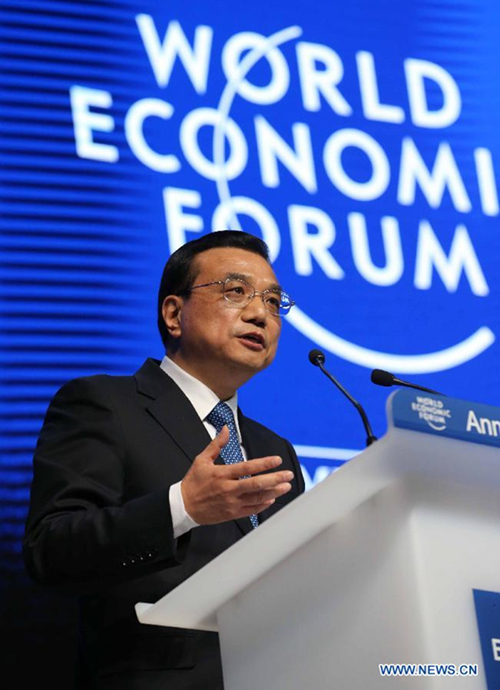Full Text: Li's address at WEF annual meeting
Xinhua, January 23, 2015 Adjust font size:
|
Chinese Premier Li Keqiang delivers a keynote speech at the World Economic Forum (WEF) annual meeting in Davos, Switzerland, on Jan. 21, 2015. [Photo/Xinhua] |
Visiting Chinese Premier Li Keqiang delivered a special address at the World Economic Forum annual meeting in Davos Wednesday.
The following is the full text of Li's address:
Uphold Peace and Stability, Advance Structural Reform and Generate New Momentum for Development
Special Address by H.E. Li Keqiang
Premier of the State Council of the People's Republic of China
At the World Economic Forum Annual Meeting 2015
Davos, 21 January 2015
Professor Klaus Schwab, President Simonetta Sommaruga, Distinguished Guests, Ladies and Gentlemen, Dear Friends,
It gives me great pleasure to come to Davos again after five years to attend the World Economic Forum Annual Meeting 2015. Davos is a town of peace and serenity, yet the world outside is not tranquil. We need to work together to shape the world in a new global context. I was told that Davos used to be a resort for recuperation from lung diseases, and the later discovery of Penicillin changed that. Now it is a place for people to gather and pool their wisdom for "brain-storm". Personally, I find this more than relevant, because our world also needs new forms of "Penicillin" to tackle new challenges that have emerged.
Admittedly, the world today is by no means trouble-free. Regional hotspots, local conflicts and terrorist attacks continue to flare up, posing immediate threats to humanity. Global economic recovery lacks speed and momentum. Major economies are performing unevenly. Commodity prices are going through frequent fluctuations. And signs of deflation have made the situation even worse. In fact, many people are quite pessimistic about the future of the world. They believe that the guarantee of peace is weak, and the prospect of development is elusive.
A philosopher once observed that we cannot solve problems by using the same kind of thinking we used when we created them. Indeed, old problems can no longer be solved by clinging to the outdated mindset of confrontation, hatred and isolation. Dialogue, consultation and cooperation must be explored to find solutions to new problems. It is important that we draw lessons from history, and pool our collective wisdom to maximize the convergence of interests among countries. Fortunately, in time of hardship and trial, mankind have always been able to find the courage to get out of the predicament and move ahead through change and innovation.
In a world facing complex international situation, we should all work together to uphold peace and stability. This year marks the 70th anniversary of the victory of the world' s anti-Fascist war. To uphold peace and stability serves the interests of all people in the world. The world order established after World War II as well as generally recognized norms governing international relations must be maintained, not overturned. Otherwise, prosperity and development could be jeopardized. The Cold War and zero-sum mentalities must be abandoned. The "winner takes all" approach will not work. Regional hotspots and geopolitical conflicts must be resolved peacefully through political means. Terrorism, in all its manifestations, must be opposed. China remains committed to peaceful development and regional stability. And China has no intention to compete with other countries for supremacy. Peace in the world must be cherished the same as we cherish our eyes, so that the achievements and benefits of civilization, including reason and justice, will prevail.
In a world of diverse civilizations, we should all seek to live in harmony. Cultural diversity, like biodiversity, is a most precious treasure endowed to us on this planet. And human society is like a garden where all human civilizations blossom. Different cultures and religions need to respect and live in harmony with each other. While maintaining the natural close ties among those with whom we see eye to eye, we also need to respect those with whom we disagree. Like the vast ocean admitting all rivers that run into it, members of the international community need to work together to expand common ground while accepting differences, and seek win-win progress through inclusive cooperation and mutual learning.
In a world facing volatile economic situation, we should all work to promote opening-up and innovation. What has happened since the outbreak of the international financial crisis seven years ago proves that to work in unity is the surest way for countries to get over the difficulties. We are all interdependent in this world. While we each have the right to adopt economic policies in line with national conditions, we need to strengthen macro-policy coordination to expand the convergence of interests and achieve common development. An European proverb says, "when the wind of change blows, some build walls, while others build windmills." We need to act along the trend of our time, firmly advance free trade, resolutely reject protectionism, and actively expand regional economic cooperation. We need to build global value chains, and seize the opportunity of a new technological revolution. While the international community agree on the importance of macro-policies to the economy, they also recognize the urgency to go ahead with structural reform. Structural reform must be carried through no matter how difficult it is, as it is an effective way to foster conditions conducive to global innovation and bring about new momentum for global development.
